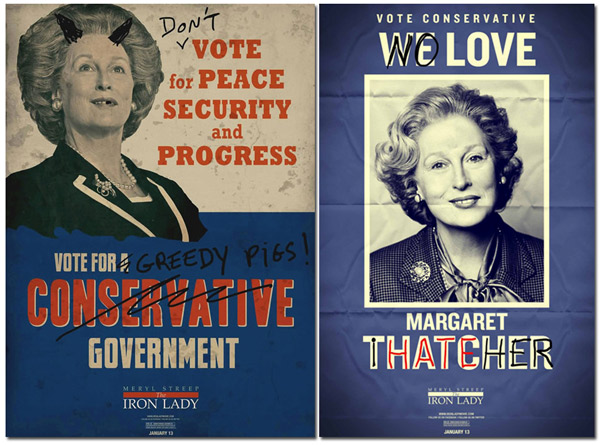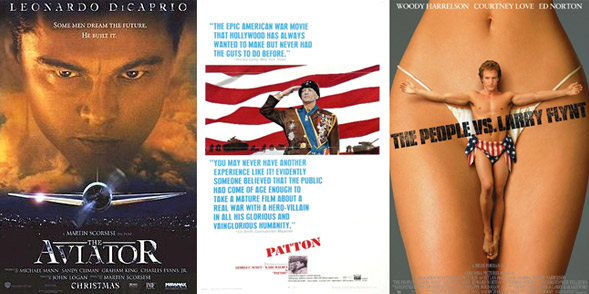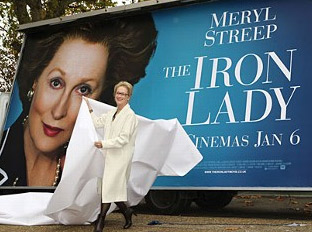Michael C. here, just returned from witnessing Meryl Streep in all her awards bait glory.
When controversy arrives in Phyllida Lloyd’s Thatcher biopic The Iron Lady, it comes in the standard form of news footage montages depicting seas of angry protesters clashing with policemen. The actual substance of the issues - massive union strikes, war in the Falkland Islands – is not discussed so much as reframed in the most generic possible terms. Every issue boils down to the same dynamic: Thatcher’s opponents are invariably lily-livered scaredy cats pushing for compromise if not outright surrender, while The Iron Lady holds firm to strength, courage, and principle over popularity. The filmmakers would no doubt say that they are focusing on character over unimportant detail, but it has the direct effect of letting Thatcher off the hook for her positions. Conservatives are free to mentally fill in their ideology and cheer her resolve, while the rest are encouraged to ignore partisanship and admire her gumption.

To be fair to the filmmakers, if Iron Lady had taken the opposite tack and really dug into the thought process of why Thatcher did what she did it would no doubt serve to amplify charges that the movie was aggrandizing its subject. It appears to be a case of damned if they did and damned if they didn’t. The very act of storytelling itself invites the audience to understand the protagonist’s motives and actions. It begs the question: Can biopics help but glorify their subjects?
Even if the film in question isn’t an out-and-out whitewash it will usually highlight the most admirable attributes of the subjects, if only because those attributes all are likely the reason the film was made in the first place. We can admire Howard Hughes visionary mind or cheer Larry Flynt first amendment crusade, while their less savory personality traits are glossed over or made to appear inconsequential in comparison. The consequences of Thatcher’s policies are vaguely alluded to in Iron Lady, but the most damning material in the film portrays her as a demanding boss and absentee homemaker, which is actually just a roundabout way of flattering her for how seriously she took her position.
 Biopics thrive on controversial big characters. But do they glorify them?
Biopics thrive on controversial big characters. But do they glorify them?
One would think that the solution to the problem would simply be to produce the most accurate, three-dimensional portrait of the subject possible and let the chips fall where they may, but ironically the more accurately a film portrays a person’s flaws the more willing audience can be to overlook them. If we feel we understand the lead inside and out then that is like a license to issue a pardon, much the way we excuse our own family members because we just know how they are. Sure Capote used many questionable tactics to obtain his material, but in his eyes he was justified, and after all, he never escaped suffering for his flaws. Sure Gen. Patton was a hard-hearted SOB but he was merely acting according to his nature and at least he was always honest about who he was.
There are two ways movies use to subvert the tendency of biopics to elevate their subjects. One is two make the lead totally unrelatable, someone with so little self-awareness the audience will feel no connection. Oliver Stone tried something like this in W but it made for a weaker film as the material became shallow and cartoonish rather than risk being seen as an endorsement. The other, more effective technique is to add a second protagonist to serve as an audience surrogate and subvert the viewer’s connection to the subject. Shattered Glass never comes close to softening Stephen Glass’s unethical weasliness because we witness it all through eyes of Chuck Lane and share his growing horror at Glass’s behavior.
 But in this example we are already moving away from the biopic to a sort of docudrama. Some degree of hero worship is probably unavoidable in the traditional biopic model. Any halfway decent life story is going to involve the viewer in seeing the world through the subject’s eyes and even the worst among us are the heroes of our own story.
But in this example we are already moving away from the biopic to a sort of docudrama. Some degree of hero worship is probably unavoidable in the traditional biopic model. Any halfway decent life story is going to involve the viewer in seeing the world through the subject’s eyes and even the worst among us are the heroes of our own story.
Thought of an example of a biopic that really holds its subject's feet to the fire? Want to defend Iron Lady's depiction of Thatcher? Let me know in the comments. You can follow Michael C. on Twitter at @SeriousFilm or read his blog Serious Film